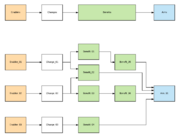COWI2020
(→Earned Value Analysis) |
(→Earned Value Analysis) |
||
| Line 20: | Line 20: | ||
To successfully execute an EVA the following steps needs to be done: | To successfully execute an EVA the following steps needs to be done: | ||
| − | |||
'''1) Time-based schedule''' | '''1) Time-based schedule''' | ||
'''2) Work breakdown structure''' | '''2) Work breakdown structure''' | ||
Revision as of 15:51, 21 February 2020
Stakeholder Management
blabla badnb
Benefits Map
Benefits Map helps mapping possible benefits related to different projects and/or programs. This is to make it easier to pick the solutions giving the most or best benefits for the relevant stakeholders. Examples on benefits could be economical aspects or user friendliness. It is important to include key stakeholders and get their input in the benefit mapping process.
The Benefit Mapping Process is usually divided into three important stages; identification of benefits, execution of benefits and the sustain of benefits. This means that the process is not only something that needs to be implemented from the start, but carried out throughout the project and even after project implementation.
Earned Value Analysis
An Earned Value Analysis (EVA) used quantative analysis techniques and object performance indicators to measure both work progress and related cost to determine the overall efficiency of a respective activity, work package or project. To be able to do this the analysis takes into account the scope of the project, the schedule of work and the work undertaken. This is to map the current situation, how much resources that has already been used and how much recourses that is necessary to finalize the project.
To successfully execute an EVA the following steps needs to be done:
1) Time-based schedule
2) Work breakdown structure
